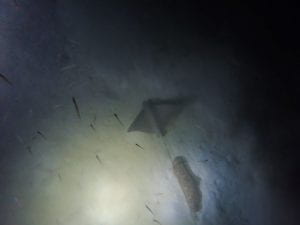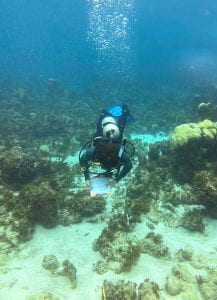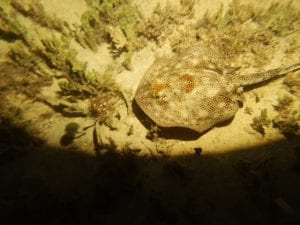Earlier in the week, we finally got to visit Ocho Rios, as well as Dunn River Falls! The experience was awesome and one I will never forget. On the bus ride up to Dunn’s River Falls, Julia was kind enough to lend me her GoPro with a chest strap so I could record myself climbing the falls. With the GoPro in hand and a plan to reach the top with Dan, when we finally got there, we climbed the waterfall as fast as we could.
Unknowingly, we took some of the easier routes on the falls and climbed it at first in about fifteen minutes, essentially leaving the class behind. Waiting at the top for the rest of our classmates, we decided to check out the beach area, which was right at the base of the falls. Leading up to the beach, I sprinted past my group and dove into the water, as I have at many other beaches, and I think I sparked an idea in my group as they all shortly followed, which in classic Jamaica fashion, the water was clear and warm. After meeting up with the rest of the class to snap a quick picture in the water, we decided to climb back up the waterfall. It took some convincing for Dan to climb back up the waterfall, but it was a decision he did not regret, as now we did it with the rest of the class.
Upon my second climb up the waterfall, this time I did not climb it nearly as quickly due to an almost disastrous situation and a genius idea sparked by Professor Warren to climb up what is known as the fire hydrant. The fire hydrant is essentially a part that is steep, and there is a ton of water crashing down, meaning it needs to be done blindly. The aforementioned disastrous situation that almost occurred had nothing to do with my physical well-being but the question of how secure my shorts were onto my body. To put it simply, if luck were not on my side, my shorts may or may not have left my body due to the tons of water crashing down on me. Thankfully, in the end, it worked out, and no one was scarred, I hope. In the end, I did not make it up this part of the waterfall. [Ed note: Neither did either instructor…]
Ocho Rios was a great time. Although it was limited, it was nice to see some of the town and how life differed from that of back home. We had a nice lunch at a place called Reggae Alley and did a little shopping around for some souvenirs. Later in the week was the start of the research project, which was cool to finally be able to conduct some field research because at this point, we spent a lot of time learning the names of the organisms, and to put that knowledge to use was rewarding in its own sense.
Another highlight of this trip for me was the fish gods were not on my side while out night snorkeling. For the story’s sake, let’s say about a 5-foot-long barracuda weighing about 50–60 pounds (not to be confused with a one and a half to two-foot needlefish weighing about 10–15 pounds) leaped out of the water and attempted to bite my face off because it thought I was food, as I was carrying a light, leaving me with war wounds and a massive scar on my face, which is totally an accurate story and people can back me up on this.
There are many other stories that were made on this trip that I will be telling people for a long time that I personally think are hilarious and it was well worth being a part of. Anyway, coming up to the end of this trip, it is sad that we all must go back to the cold weather. Still, this has easily been one of my favorite classes during my time at Stony Brook, and I’m looking forward to ending this trip with other funny stories and cool memories.

Almost needed to become a mummy to save my beautiful face but thankfully Neosporin exists. I’m not sure professor Peterson and Warren were convinced it was a barracuda though.

Moments before the almost most embarrassing/ funniest moment during the whole trip.
-Jaden























